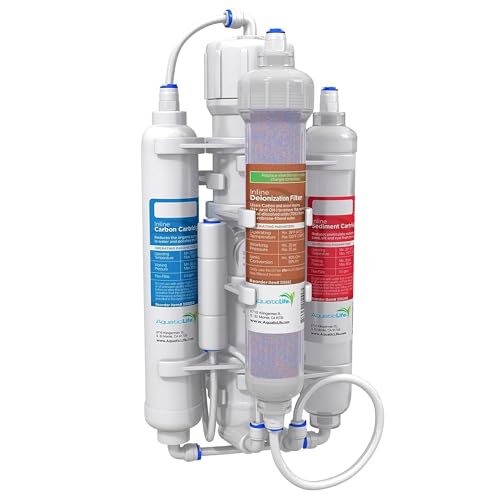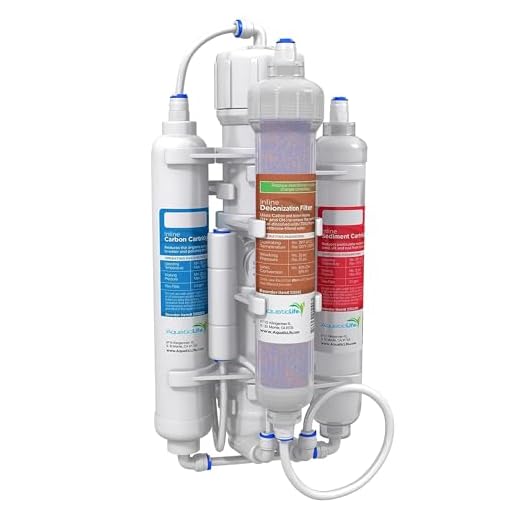Reef
Blog
How to lower the hardness of aquarium water

Many aquarium owners struggle with hard water in their tanks, as it can have negative effects on the health of their aquatic pets. Hard water is typically high in minerals such as calcium and magnesium, which can lead to issues like pH imbalance and the formation of unsightly mineral deposits.
To combat this problem, there are several methods you can try to lower the hardness of your aquarium water. One approach is to use a water softener, which is a filtration system that removes minerals from the water. These devices can be installed directly onto your aquarium and work by exchanging the minerals for sodium or potassium ions.
Another option is to dilute the hard water with softer water. This can be done by either using a mixture of tap water and distilled water or by collecting rainwater. Just be sure to test the pH and mineral levels of the softer water before adding it to your tank, as they can vary.
Additionally, you can try adding substances that naturally soften water, such as peat moss or almond leaves. These organic materials release tannins and other compounds that can help reduce the mineral content and pH of the water. Simply place the peat moss or almond leaves in a mesh bag and allow them to steep in your tank for several days.
Remember that it’s important to monitor your water parameters regularly, as maintaining the ideal hardness and pH levels is crucial for the well-being of your aquarium inhabitants. By implementing these strategies and finding the right balance for your specific tank, you can successfully lower the hardness of your aquarium water and create a healthier environment for your aquatic pets.
It’s worth noting that sudden changes in water chemistry can be stressful for fish, so it’s recommended to make adjustments gradually over time. Keep a close eye on your aquarium inhabitants and monitor their behavior during the transition period.
What is water hardness and its impact on aquariums
Water hardness refers to the concentration of minerals, specifically calcium and magnesium, in the water. It is measured in grains per gallon (GPG) or parts per million (PPM). The higher the mineral content, the harder the water.
Hard water can have several effects on aquariums and the fish that live in them.
Impact on fish
Excessive hardness can be harmful to fish, as some species are more sensitive to changes in water chemistry than others. Hard water can affect the osmoregulation process in fish, which is the regulation of water and salt levels within their bodies. It can cause stress, impaired growth, weakened immune system, and even death.
Impact on aquarium equipment
Hard water can also have negative effects on aquarium equipment. Minerals in the water can accumulate and clog filters, heaters, and other equipment, reducing their efficiency and lifespan. It can also leave mineral deposits on glass and decorations, requiring frequent cleaning.
Therefore, it is important to regularly monitor and manage the water hardness in your aquarium to ensure the health and well-being of your fish, as well as the longevity of your equipment.
Sources of hardness in aquarium water
Hardness in aquarium water refers to the level of minerals, specifically calcium and magnesium, dissolved in the water. These minerals can originate from different sources, both within and outside of the aquarium. Understanding the sources of hardness can help aquarium owners identify the best strategies for lowering it.
1. Tap water
The most common source of hardness in aquarium water is tap water. Many municipal water supplies contain elevated levels of calcium and magnesium, which can contribute to the overall hardness. The hardness of tap water can vary depending on the geographical location and the specific water treatment process employed by the local water provider.
2. Substrate and rocks
The substrate and rocks used in the aquarium can also contribute to the hardness of the water. Certain types of substrates and rocks, such as limestone or coral-based materials, naturally contain high levels of calcium carbonate. Over time, these materials can leach into the water, increasing the hardness.
3. Decorations and driftwood
Decorations, including shells, corals, and ornaments, can release minerals into the water and contribute to hardness. Similarly, driftwood, especially those sourced from certain types of trees, may release tannins and other compounds that can affect the water chemistry, including hardness.
4. Fish food and supplements
Fish food and supplements can also be a source of hardness in aquarium water. Some fish foods are fortified with minerals, such as calcium or magnesium, to support the health and growth of fish. While these additives can be beneficial for the fish, they can also contribute to the overall hardness of the water.
5. Biological processes
The biological processes occurring within the aquarium can also impact the hardness of the water. For example, the breakdown of organic matter, such as fish waste, can release minerals into the water, increasing hardness. Additionally, the presence of certain bacteria or algae can alter the water chemistry, leading to higher hardness levels.
By understanding the various sources of hardness in aquarium water, aquarium owners can take appropriate measures to lower and maintain the desired hardness levels for their aquatic pets.
Effects of high hardness on aquarium inhabitants
High hardness in aquarium water can negatively impact the health and well-being of the inhabitants. It is important to understand the potential effects of high hardness in order to ensure a suitable environment for the aquatic life.
1. Limited adaptability
Aquatic organisms have varying degrees of adaptability to different water conditions. While some species thrive in harder water, others may struggle to survive. High hardness can limit the availability of essential nutrients and minerals, making it difficult for certain organisms to function properly.
For sensitive species, high hardness levels can cause stress and prevent them from breeding or reproducing. This limitation in adaptability can lead to a decrease in biodiversity within the aquarium.
2. Altered pH levels
High hardness often correlates with high alkalinity, which can significantly impact the pH levels of the water. Fluctuating pH levels can be stressful for aquarium inhabitants, as it can disrupt their internal physiological processes.
Some species have specific pH requirements for survival and reproduction. When the pH deviates from their ideal range, it can have detrimental effects on their overall health. It can also impact the effectiveness of medications and treatments, making it challenging to maintain a healthy environment for the inhabitants.
Furthermore, high hardness can contribute to the formation of hard water deposits on aquarium equipment and decorations, which can be unsightly and difficult to remove.
3. Negative impact on overall health
Extended exposure to high hardness can lead to chronic health issues in aquarium inhabitants. The stress caused by suboptimal water conditions weakens their immune system, making them more susceptible to diseases and infections.
Additionally, high hardness can interfere with the ability of fish to efficiently regulate their osmotic balance. This can lead to problems with the gills and other vital organs, impairing their overall health and well-being.
To conclude, it is crucial to monitor and regulate the hardness levels of aquarium water to maintain optimal conditions for the inhabitants. Providing suitable hardness levels will enable the aquarium organisms to thrive, reproduce, and maintain good health.
Methods for lowering the hardness of aquarium water
High levels of hardness in aquarium water can cause various issues for fish and other aquatic life. Fortunately, there are several methods available to help lower the hardness of aquarium water:
1. Using reverse osmosis water: Reverse osmosis (RO) water is considered one of the most effective methods to reduce water hardness. This water filtration process removes most of the minerals responsible for hardness, resulting in softer water.
2. Mixing with distilled or rainwater: By mixing your tap water with distilled or rainwater, you can dilute the hardness levels. Keep in mind that rainwater may contain pollutants, so it’s important to collect it in a clean and safe manner.
3. Adding peat moss or almond leaves: Peat moss and almond leaves can release tannins into the water, which helps lower the pH and hardness. Simply add a small amount of either to your aquarium, but be aware that this method may also darken the water.
4. Using water conditioners: Certain water conditioners are specifically designed to reduce water hardness. They contain ingredients that bind to the minerals causing hardness, making them less available in the water. Follow the product instructions for proper usage.
5. Boiling water: Boiling tap water for a few minutes can help reduce its hardness. After boiling, let the water cool down to room temperature before adding it to the aquarium.
6. Seachem Equilibrium or similar products: These products are formulated to restore and maintain the natural mineral balance in freshwater planted aquariums. They can help stabilize hardness levels while providing essential minerals for aquatic plants and animals.
In conclusion, it’s essential to monitor and maintain appropriate hardness levels in your aquarium. By using one or a combination of these methods, you can effectively lower the hardness of your aquarium water and create a healthier environment for your aquatic pets.
“Question-Answer”
What is the hardness of aquarium water?
The hardness of aquarium water refers to the concentration of minerals, such as calcium and magnesium, in the water. It is usually measured in terms of carbonate hardness (KH) and general hardness (GH).
Why is it important to lower the hardness of aquarium water?
Lowering the hardness of aquarium water is important because some fish and plants thrive in softer water conditions. Water hardness can affect the overall health and well-being of aquatic organisms, as well as their ability to reproduce.
What are some signs that the aquarium water is too hard?
Signs that the aquarium water is too hard include excessive algae growth, poor plant growth, fish stress or illness, and difficulty in maintaining a stable pH level. Additionally, some fish species may exhibit abnormal behavior or have a shortened lifespan in hard water.
How can I lower the hardness of my aquarium water?
There are several methods to lower the hardness of aquarium water. One common method is to use reverse osmosis (RO) or distilled water for partial or total water changes. Another option is to use specific aquarium water conditioners that are designed to lower hardness. Adding natural substances like peat moss or almond leaves to the aquarium can also help in reducing water hardness.
Are there any risks associated with lowering the hardness of aquarium water?
Lowering the hardness of aquarium water may cause a decrease in pH levels, which could potentially harm some fish species that prefer slightly alkaline water. It is important to carefully monitor water parameters and make gradual adjustments to prevent sudden changes that may stress or harm the aquarium inhabitants.
What is the hardness of aquarium water?
The hardness of aquarium water refers to the amount of dissolved minerals, such as calcium and magnesium, present in the water. It is measured in degrees of hardness (dH).




